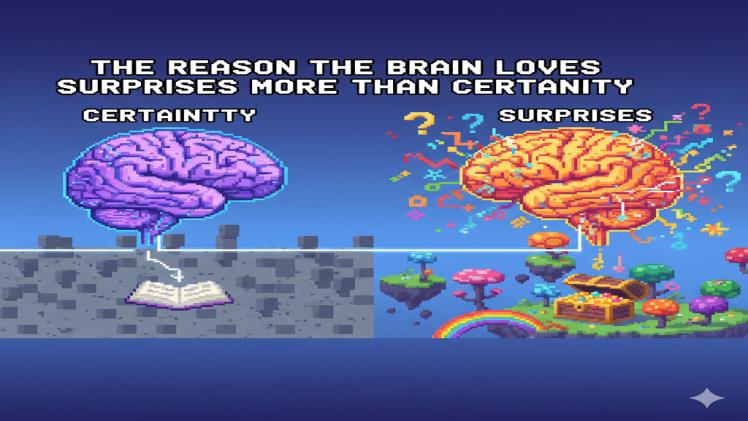We are human beings accustomed to. We prefer habitual things, regulated time, and what will happen next. And nevertheless, there is something in the unexpected that seizes our attention as no other thing. It is our brain, which is set up to anticipate surprises, whether it is a twist in a tale, a pop-up, or just a dose of random excitement—a reward—even when certainty would be safer and cosier.
The Allure of the Unexpected
Predictability feels safe. It eases the mind, prevents decision burnout, and makes our day run smoothly. However, there is a flip side to this: an excess of certainty is tiresome. We lose track, we lose interest, we become bored, and we need to find something new to jolt us off the autopilot.
On the contrary, surprises arouse curiosity. The surprise creates a rush of anticipation, making our brains perk up. The slightest deviation from the commonplace —a new menu entry, a surprise email, or an unexpected alert — can trigger neural pathways involved in attention and motivation. It is not only excitement; it is a mental stimulus. It informs us: “Something is interesting going on here.” Pay attention.
Behind the Thrill Neuroscience.
Dopamine, the chemical messenger of pleasure and reward, is the key to our affection for surprises. When we expect a reward that may or may not come, dopamine levels are higher than when the reward is certain. That is why variable rewards are more satisfying than predictable ones. This is what behavioural psychologists call a dopamine loop—the driving force behind everything from checking notifications to seeking out new online casino.
The nucleus accumbens and the prefrontal cortex are key brain regions that are specifically sensitive to unpredictability. They assist us in balancing our risks, assessing possible results and evaluating in seconds whether to respond to a stimulus or to leave it alone. The amygdala also enters into the mix, contributing emotional red to the surprises, which can account for the disproportionate thrill of unexpected wins or twists.
Such anticipation, risk assessment, and emotional reactions create a mental space in which we feel we are being given fuel for our mental engines through surprises. It is a great source of interest and involvement; it can shape not only individual behaviour but also the design of online experiences.
Shocks in the Digital Realm.
Digital platforms are the experts at exploiting this innate propensity to uncertainty. Even think online, where rewards are given on a variable basis: badges, content unlocks, notifications, or even digital spins that can bring nothing or everything. These mechanics are gentle ways of reinforcing patterns of behaviour, making interactions more interesting by capitalizing on attraction. For example, constant random bonus triggers or mini events may highly engage users of Bizzo Casino Australia. Although the site itself is a gambling game, the mechanics behind it are not about betting, but rather about the brain’s reaction to varied rewards. Unforeseen events trigger the release of dopamine, reward anticipation, and immediate gratification, keeping users engaged in the moment and preventing passive scrolling and clicking.
However, this is not only true of gaming. The same mental inclinations are used by apps, social media feeds, and even learning platforms. Digital experiences leverage the urge to stay new and subtly control behaviour by introducing variable rewards. This may enhance increased involvement, re-engagement, and excitement that can never be achieved by sheer predictability.
The Surprise Effect Psychology.
As a behavioural economist, people are programmed to give unwanted positive results. Cognitive biases, such as risk-seeking in situations of uncertainty and variable reward sensitivity, imply that any small surprise can have a disproportionate effect on our decisions. These trends justify why individuals seek newness, use new apps, or look forward to updates despite the low likelihood of reward.
It has something to do with decision fatigue. Once decisions get repetitive, the brain desires something that disrupts the habit. Surprises make the routine different, attention more refreshed, and engagement loops more secure. This is why digital platforms, such as online entertainment platforms like Bizzo Casino Australia, are well-equipped to handle so-called occasional disruptions to the expected order without turning everything into chaos.
Even joking aside, this is not about entertaining people. Understanding how much the brain loves surprises teaches us about motivation, attention, and even how to design an experience that will not overburden cognitive load but will improve engagement. It is a reminder that uncertainty, when used wisely, is more compelling than certainty.

